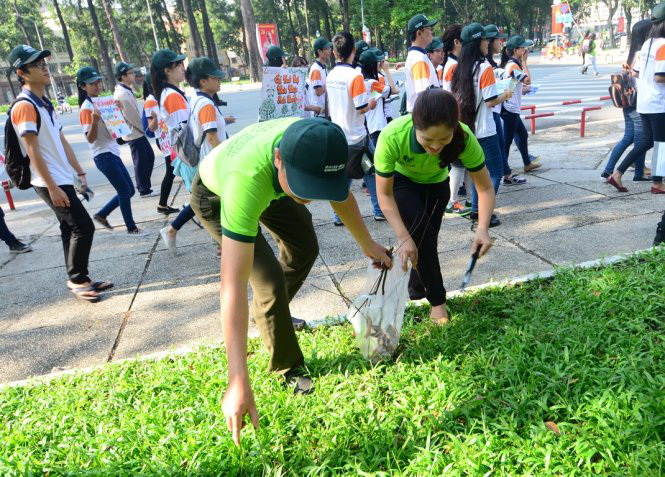Editor’s note: Two Tuoi Tre (Youth) newspaper readers have agreed that making Ho Chi Minh City a better place to live should begin with tasks as simple as keeping the hub neat and clean.
Luu Dinh Long, one of the two readers, shared two photos that one of his friends had taken at the T-junction in Dong Quang, located in District 12, Ho Chi Minh City.
The friend then posted the photos on his Facebook page together with a status lamenting that every morning when he drives his child through the area on their way to school, the pair hold their breath and drive past as quickly as possible to get away from the foul odor emanating from a huge pile of garbage that has been heaped up there.
After seeing a man erecting a sign discouraging locals and passengers from littering, Long’s friend thought the spontaneous dumping ground would soon disappear.
However, he was frustrated that the dumping site has in fact grown since.
Many people in Vietnam and Ho Chi Minh City in particular have put up similar signs in an attempt to stop people from urinating or littering in public spaces.
Paradoxically, these signs seem to encourage mindless people to perform these disrespectful acts more frequently.
Such reliance on people’s limited awareness and what are cursory warnings only - not accompanied by the authorities’ surveillance or specific fines - has failed to achieve results.
The lack of any behavioral-correction mechanism means the expectations of city-dwellers and those who love the city are going unmet.
It’s a big relief, however, to know that somewhere in the city there are still youths such as a group called “Nhat Rac Sai Gon” (Saigon Litter Pickers) who have volunteered to collect and rid the city areas of rubbish.
These young volunteers observe that some of the suggestions to deter people from littering – including providing sufficient trash bins, imposing strict rules, and raising awareness among residents – are starting to resonate with children, who the group is hopeful will soon grow out of the habit of littering.
If such deeds are performed on a regular basis, and campaigns like the one called “For a Civilized, Clean, Safe City,” which was jointly organized by the Go Vap District section of the Vietnam Buddhist Sangha and the Go Vap division of the Vietnam Fatherland Front Committee in June this year, the city’s streets will surely be free from litter. The heads of many local pagodas also run such programs in certain parts of the city every Sunday.
With such promotion and awareness alongside action, we would no longer need to feel suffocated or upset at the prospect of bumping into plastic bags full of trash or stepping onto human or dog feces every time we hit the road.
Such environmental campaigns would be more effective with the government’s constant involvement so that there would come a time when people no longer have the habit of littering.
Developing residential clusters
Nguyen Hoang Chuong, who lives in the Central Highlands province of Lam Dong, said that people of his generation would always think of Saigon, or Ho Chi Minh City, as the Pearl of the Far East.
As his two children are working in the economic center, he keeps a close watch on the city’s growth.
The question of how to turn Ho Chi Minh City into a better place to live is perhaps raised by not only city-dwellers but also all Vietnamese citizens.
With a population of over eight million, the city is home to millions of households and hundreds of thousands of residential clusters.
If these “smaller units” are working together to build their city, it would soon realize its expectations as a metropolis that is not only fit for habitation but is also actually worth living in.
In every family, grandparents and parents are supposed to set the example to their children and teach them good manners, including keeping their homes neat and not littering in public.
Elders and adults are also advised to live in harmony with their neighbors, be tolerant toward others, frugal in their consumption of tap water and electricity, and abide by traffic rules so as to cherish such good habits amongst their kids.
It’s suggested that heads of residential clusters have their members make commitments on their good manners, and ensure constant monitoring, as self-awareness is fostered thanks to publicity and cemented with locals’ knowledge that they are put under constant surveillance.
It’s also important that these leaders work with owners of karaoke parlors, pubs and online gaming shops regarding their opening hours and corporate ethic codes.
Such cooperation should ensure compliance with social order norms established by local authorities among shop owners.
Members of such residential clusters should also collaborate to care for the needy and provide them with a means to make a living for the long-term, as poverty tends to drive one to their wits' end and renders many unable to refrain from social ills.
|
This is a part of a series on ideas to make Ho Chi Minh City a better place to live in. |






















































